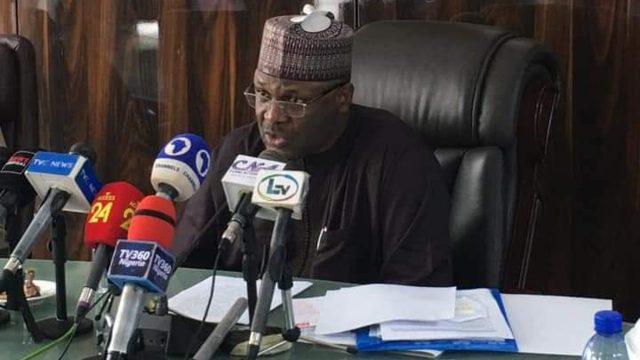The chairman of the Independent National Electoral Commission (INEC), Prof. Mahmood Yakubu, has declared that conducting a general election in Nigeria is like holding election in the whole of West Africa and beyond.
Yakubu, who spoke during an engagement with the media and other stakeholders in Lagos, last Thursday, however, disclosed that the Commission has over the years innovated various way to effectively carry out its responsibilities as assigned by the Constitution and deepen the country’s democracy.
According to him, Nigeria’s size and population make it one of the biggest democracies in the world.
“It is certainly the second largest presidential democracy after the United States of America. The size of our voter population and elective institutions make elections in Nigeria a huge undertaking. This fact is better appreciated within our regional context. There are 15 countries in West Africa today, including Nigeria. However, with the current voter population of over 84 million, Nigeria has about 11 million more registered voters than the other 14 countries put together which have 73.6 million registered voters. Conducting a general election in Nigeria is like holding election in West Africa and beyond,” he said.
He revealed that the country’s current voter population stood 84,004,084, which excludes the ongoing Continuous Voter Registration, adding that it has 176,846 polling units; 8,809 registration areas or wards and 1, 567 constituencies.
Yakubu noted that it was the expansion voter access to polling units under his watch that brought the number of the polling units to 176,846.
His words: “For 25 years, between 1996 and 2021, the number of polling units in Nigeria remained the same, despite the progressive increase in the number of the voting population over the years. For instance, in 1999, the number of registered voters was 57,938,945; 60,823,022 in 2003; 61,567,036 in 2007; 67,422,005 in 2015 and 84,004,084 in 2019. Yet, the number of PUs remained the same.
“While the law gives INEC the power to create new PUs and allocate voters to them, all attempts made by the Commission to do so within the period were met with spurious allegations based on political considerations. Following several unsuccessful attempts to create additional PUs, the Commission established Voting Points and Voting Point Settlements across the States of the Federation and the Federal Capital Territory (FCT). After wide-ranging consultations with stakeholders and fieldwork by our officials, the 56,872 Voting Points and Voting Point Settlements were converted to full-fledged Poling Units in April 2021 bringing the total number of PUs in Nigeria to 176,846.”
He noted that the Commission was determined to deepen the use of technology and reduce human intervention in the critical stages of the electoral process, adding that ‘beyond that, the COVID-19 pandemic changed the way things are done around the world.”
He, therefore, stated that the Commission has been discouraging human intervention in the electoral process, stressing that since the 2019 general election, activities like voter pre-registration, nomination of candidates for election by political parties, accreditation of national and international observers for elections, accreditation of media organisations for elections and submission of list of polling and collation agents by political parties are now conducted either partially or entirely online.
He added: “In our effort to engender transparency in the electoral process, the Commission unveiled the INEC Result Viewing (IReV) portal to make available for public view copies of the polling unit election result sheet, known as Form EC8A on Election Day. By clicking on http://inecelectionresults.com and creating an account and password, any interested Nigerian can have access to the portal and view polling unit results are they are uploaded live. The Nasarawa Central Constituency bye election held on August 8 was the first to have its polling units’ results uploaded to the portal, followed by the Edo and Ondo governorship elections. However, before the introduction of IReV, the Commission had, during the 2017 Anambra State governorship election, introduced the pasting of Form EC 60E, also known as the “People’s Result Sheet” at Polling Units, where citizens could view the result of each polling unit.”
Yakubu said the Commission was not unaware of the issues raised about the performance of the new technology it deployed for voter accreditation during the recent governorship election in Anambra State, saying:
“The deployment of the BVAS in the Anambra governorship election was the second pilot test. It was intended to achieve two objectives. First is voter accreditation to replace the Smart Card Reader. The second is the uploading of polling unit result to the IReV portal to replace the z-pad. The BVAS performed optimally in uploading results to the IReV portal, but there were the usual challenges associated with the pilot of a new technology in a major election.”
He therefore pledged continuous improvement in the process, saying: “I want to reassure Nigerians that we have learnt vital lessons from the Anambra pilot. There will be remarkable improvement in the next major election, which is the end-of-tenure Area Council election in the Federal Capital Territory (FCT) scheduled to hold in three months on February 12, 2022.”






Leave a Reply